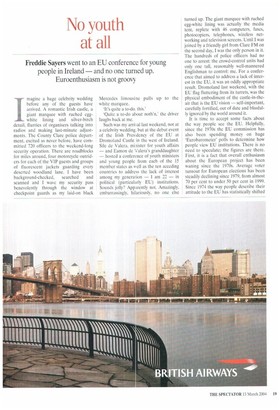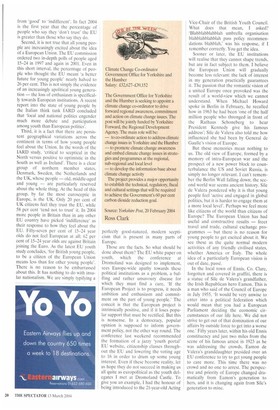o youth
at all Freddie Sayers went to an EU conference for young people in Ireland — and no one turned up. Euroenthusiasm is not groovy Imagine a huge celebrity wedding before any of the guests have arrived. A romantic Irish castle, a giant marquee with ruched eggwhite lining and silver-birch detail, flurries of organisers talking into radios and making last-minute adjustments. The County Clare police department, excited as never before, have committed 720 officers to the weekend-long security operation. There are roadblocks for miles around, four motorcycle outriders for each of the VIP guests and groups of fluorescent jackets guarding every deserted woodland lane. I have been background-checked, searched and scanned and I wave my security pass benevolently through the window at checkpoint guards as my laid-on black
Mercedes limousine pulls up to the white marquee.
'It's quite a to-do. this.'
'Quite a to-do about noth'n,' the driver laughs back at me.
Such was my arrival last weekend, not at a celebrity wedding, but at the debut event of the Irish Presidency of the EU at Dromoland Castle in the west of Ireland. She de Valera, minister for youth affairs — and Eamon de Valera's granddaughter — hosted a conference of youth ministers and young people from each of the 15 member states as well as the ten acceding countries to address the lack of interest among my generation — I am 22 — in political (particularly EU) institutions. Sounds jolly? Apparently not. Amazingly, embarrassingly, hilariously, no one else turned up. The giant marquee with ruched egg-white lining was actually the media tent, replete with 46 computers, faxes, photocopiers, telephones, wireless networking and television screens. Until I was joined by a friendly girl from Clare FM on the second day, I was the only person in it. The hundreds of police officers had no one to arrest; the crowd-control units had only one tall, reasonably well-mannered Englishman to control: me. For a conference that aimed to address a lack of interest in the EU, it was an oddly appropriate result. Dromoland last weekend, with the EU flag fluttering from its turrets, was the physical embodiment of the castle-in-theair that is the EU vision — self-important, carefully fortified, out of date and blissfully ignored by the world around it.
It is time to accept some facts about the way people see the EU. Helpfully, since the 1970s the EU commission has also been spending money on huge 'Eurobarometer' polls to determine how people view EU institutions. There is no need to speculate; the figures are there. First, it is a fact that overall enthusiasm about the European project has been waning since the 1970s. Average voter turnout for European elections has been steadily declining since 1979, from almost 70 per cent to under 50 per cent in 1999. Since 1974 the way people describe their attitude to the EU has statistically shifted from 'good' to 'indifferent'. In fact 2004 is the first year that the percentage of people who say they 'don't trust' the EU is greater than those who say they do.
Second, it is not true that all young people are increasingly excited about the idea of a European Union. The EU commission ordered two in-depth polls of people aged 15-24 in 1997 and again in 2001. Even in this short interval, the percentage of people who thought the EU meant 'a better future for young people' nearly halved to 26 per cent. This is not simply the evidence of an increasingly apolitical young generation — the loss of enthusiasm is specifically towards European institutions. A recent report into the state of young people by the Italian think tank IARD concluded that 'local and national politics engender much more debate and participation among youth than European politics'.
Third, it is a fact that there are persistent geographical variations across the continent in terms of how young people feel about the Union. In the words of the IARD study, 'critical to sceptical in the North versus positive to optimistic in the South as well as Ireland'. There is a clear group of northern member states, Denmark, Sweden, the Netherlands and the UK, whose people — old, middle-aged and young — are particularly reserved about the whole thing. At the head of this group, by far the most eurosceptic in Europe, is the UK. Only 20 per cent of UK citizens feel they trust the EU, while 58 per cent 'tend not to trust' it. In 2004 more people in Britain than in any other EU country have picked 'indifference' as their response to how they feel about the EU. Fifty-seven per cent of 15-24 year olds do not feel European at all; 62 per cent of 15-24 year olds are against Britain joining the Euro. As the latest EU youth study concludes, 'for British young people, to be a citizen of the European Union means less than for other young people'. There is no reason to be embarrassed about this. It has nothing to do with insular nationalism. We are simply typifying a perfectly good-natured, modern scepticism that is present in many parts of Europe.
Those are the facts. So what should be done about them? The EU white paper on youth, which the conference at Drornoland was designed to implement, sees Europe-wide apathy towards these political institutions as a problem, a baffling and rather unsavoury disease for which they must find a cure, 'If the European Project is to progress, it needs ambition and enthusiasm and commitment on the part of young people.' The conceit is that the European project is intrinsically positive, and if it loses popular support that must be rectified. But this is nonsense. In a democracy, popular opinion is supposed to inform government policy, not the other way round. The conference last weekend recommended the formation of a jazzy youth portal' EU website, citizenship classes throughout the EU and lowering the voting age to 16 in order to drum up some young interest. Even if these become reality, let us hope they do not succeed in making us all quite as europolitical as the youth delegates I met at Dromoland Castle. To give you an example, I had the honour of being introduced to the 21-year-old Acting
Vice-Chair of the British Youth Council. What does that mean, I asked? `Blahblahblahblah umbrella organisation blahblahblahblah pass policy recommendations blahblah,' was his response, if I remember correctly. You get the idea.
Sooner or later, the EU institutions will realise that they cannot shape trends, but are in fact subject to them. I believe the European Union will gradually become less relevant: the lack of interest in my generation practically guarantees it. The passion that the romantic vision of a united Europe once provoked was the result of a world-view which we cannot understand, When Michael Howard spoke in Berlin in February, he recalled how in 1963 he had been 'one of the half million people who thronged in front of the Rathaus Schoneberg to hear President Kennedy give his famous address'; She de Valera also told me how influenced she had been by General de Gaulle's vision of Europe.
But these memories mean nothing to us. The old view of Europe, formed by a memory of intra-European war and the prospect of a new power block to counterbalance the US and Soviet Russia, is simply no longer relevant. I can't remember the Berlin Wall falling down; the second world war seems ancient history. Sile de Valera pondered why it is that young people feel 'active and engaged in global politics, but it is harder to engage them at a more local level'. Perhaps we feel more like citizens of the world than citizens of Europe? The European Union has had useful and constructive results — freer travel and trade, cultural exchange programmes — but there is no reason for young people to get excited about it. We see these as the quite normal modern activities of any friendly civilised states, whether America or Italy. The whole idea of a particularly European vision is out of date, passé.
In the local town of Ennis. Co. Clare, forgotten and covered in graffiti, there is a statue of Sile de Valera's grandfather, the Irish Republican hero Eamon. This is a man who said of the Council of Europe in July 1955, 'It would be very unwise to enter into a political federation which would mean that you had a European Parliament deciding the economic circumstances of our life here. We did not strive to get out of that domination of our affairs by outside force to get into a worse one.' Fifty years later, within his old Ennis constituency and just two miles from the scene of his famous arrest in 1923 as he was addressing the crowds, Eamon de Valera's granddaughter presided over an EU conference to try to get young people to care more. This time there was no crowd and no one to arrest. The perspective and priority of Europe changed dramatically from Eamon's generation to hers, and it is changing again from Sile's generation to mine.



































































 Previous page
Previous page